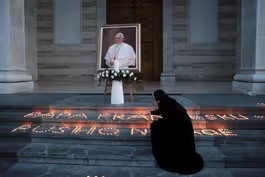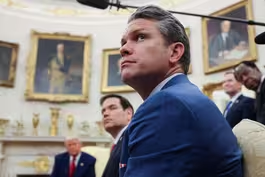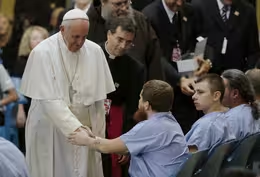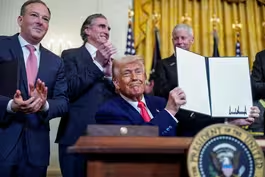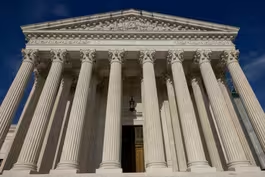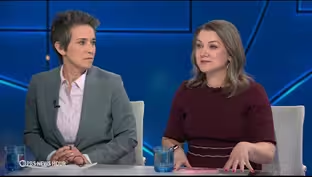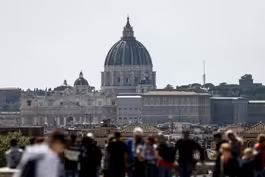
A look at Pope Francis' legacy and focus on social justice
Clip: 4/21/2025 | 7m 22sVideo has Closed Captions
A look at Pope Francis' legacy and focus on social justice
Francis' 12-year papacy was a remarkable one, working in service to the church until the very day before he died. He sought to focus more explicitly on social justice, on climate change and addressing the most marginalized in society. But he was also criticized for actions that fell short of his public remarks, undercut commitments or went too far for some Catholics. Stephanie Sy reports.
Problems playing video? | Closed Captioning Feedback
Problems playing video? | Closed Captioning Feedback
Major corporate funding for the PBS News Hour is provided by BDO, BNSF, Consumer Cellular, American Cruise Lines, and Raymond James. Funding for the PBS NewsHour Weekend is provided by...

A look at Pope Francis' legacy and focus on social justice
Clip: 4/21/2025 | 7m 22sVideo has Closed Captions
Francis' 12-year papacy was a remarkable one, working in service to the church until the very day before he died. He sought to focus more explicitly on social justice, on climate change and addressing the most marginalized in society. But he was also criticized for actions that fell short of his public remarks, undercut commitments or went too far for some Catholics. Stephanie Sy reports.
Problems playing video? | Closed Captioning Feedback
How to Watch PBS News Hour
PBS News Hour is available to stream on pbs.org and the free PBS App, available on iPhone, Apple TV, Android TV, Android smartphones, Amazon Fire TV, Amazon Fire Tablet, Roku, Samsung Smart TV, and Vizio.
Providing Support for PBS.org
Learn Moreabout PBS online sponsorshipAMNA NAWAZ: Francis' 12-year-long papacy was in many ways a remarkable one, working in service to the church until the very day before he died.
Pope Francis sought to focus more explicitly on social justice, on climate change, and addressing the most marginalized in society.
GEOFF BENNETT: But he also faced pressure for actions that some say fell short of his public remarks, undercut commitments, or went too far for some Catholics.
Stephanie Sy has a look back at his life and work.
STEPHANIE SY: He was a symbol of change and hope for the Catholic Church.
(CHANTING) STEPHANIE SY: In March of 2013, Bishop Jorge Mario Bergoglio of Argentina was elected pontiff at the age of 76.
POPE FRANCIS, Leader of Catholic Church (through translator): Thank you so much for your welcome.
Please pray for me.
STEPHANIE SY: He was a disrupter from the outset, the first pope from the Southern Hemisphere, the first Jesuit pope, and the first to choose the papal named Francis, after the saint who renounced his privilege to follow God.
It was fitting for a man who, even as archbishop of Buenos Aires, lived in a modest apartment and rode the bus.
Francis followed the late Pope Benedict XVI, the first pope to resign in 600 years.
Unlike his scholarly predecessor, Francis was known for his pastoral approach, says Natalia Imperatori-Lee, who runs the Religious Studies Department at Manhattan College.
NATALIA IMPERATORI-LEE, Manhattan College: He is committed to what is known as the signs of the times.
And Francis, with his papal priorities, the climate, migration, has really sort of looked at the world as it is, right, the grief of the world, the hope of the world, the joys of the world, and the anxieties of the world, and thought, how can the church bring attention to this?
STEPHANIE SY: Early in his pontificate, Francis made the first of what would become regular impromptu comments during back-of-plane news conferences that would spark headlines, this remark about homosexuality.
POPE FRANCIS (through translator): If someone is gay and he searches for the lord and has goodwill, who am I to judge?
STEPHANIE SY: He maintained homosexual acts were sinful, but, for queer Catholics, Francis signaled positive change and he went farther than other popes, formally allowing priests to bless same-sex couples.
DAVID GIBSON, Fordham University Center on Religion and Culture: In the end, Pope Francis didn't really change any doctrines regarding gay people, but he said that we are all sinners.
He put everybody on the same level.
STEPHANIE SY: David Gibson, the director of the Center on Religion and Culture at Fordham University, says, when it came to calling for urgent action, climate change Francis called the planet our common home.
DAVID GIBSON: That, if anything, was his social justice priority, because he believed so strongly in a culture of life, but a culture of all life.
He redefined pro-life as life from moon to tomb, but around the planet.
STEPHANIE SY: Francis opened and expanded dialogue on whether divorced and remarried Catholics could partake in communion, on the morality of contraception and on the role of women in church leadership.
He ultimately dismissed the idea of women becoming priests or deacons, but under him the most recent church synod, traditionally a summit of bishops, included laypeople and women.
That led in part to this thinly veiled criticism by American Cardinal Raymond Burke.
CARDINAL RAYMOND BURKE, Former Vatican Official (through translator): Today's bishops and cardinals need a great deal of courage to confront the grave errors that come from within the church itself.
STEPHANIE SY: Francis sidelined Burke and other dissenters.
DAVID GIBSON: Towards the end of his papacy, Pope Francis was getting a bit fed up with the conservative critics, especially those based in the United States.
I mean, they weren't just criticizing him.
They were saying he was an apostate, saying he was a heretic.
They were setting themselves up almost as anti-popes.
STEPHANIE SY: Francis inherited the sexual abuse epidemic infecting the church, and, like his predecessors, he fumbled his way through it.
In early 2018, Francis visited Chile to apologize for the sexual abuse of dozens of minors over decades by Father Fernando Karadima.
POPE FRANCIS (through translator): I cannot but manifest the pain and the shame, shame that I feel for the irreparable damage done to children by church ministers.
STEPHANIE SY: But his apology was overshadowed by his defense of Bishop Juan Barros, who had been accused of covering up the abuse.
Francis told accusers they needed to provide proof.
On the plane home, he apologized, but the damage was real.
NATALIA IMPERATORI-LEE: His words really hurt survivors in real ways.
It caused material harm to them to not be believed again at the highest levels of the church.
STEPHANIE SY: During his papacy, he expanded rules for internal policing and prosecuting sex abuse cases.
Francis was welcomed by leaders near and far on his papal missions.
On a trip to Canada, he apologized for the Catholic Church's role in the cultural genocide of indigenous tribes.
And, in 2015, he came to the U.S., where he became the first pope to address Congress, with a soaring vision of an America united in compassion.
POPE FRANCIS: We must move forward together as one in a renewed spirit of fraternity and solidarity, cooperating generously for the common good.
STEPHANIE SY: He sought to elevate the church's influence on moral issues until the very end.
In an open letter to American bishops, he recently called the Trump administration's mass deportation policy -- quote -- "a major crisis that damages the dignity of many men and women and of entire families."
The issue wasn't reported to have come up during U.S. Vice President J.D.
Vance's brief meeting with him on Sunday.
Vance, a Catholic, is the last known world leader to have met with the pope.
After the meeting, Pope Francis spent his final full day among the masses, gathered at St. Peter's Square for Easter.
Whether Francis' approach and his efforts to shift the church on some key issues will continue to have impact is an open question.
DAVID GIBSON: Was Pope Francis a success?
The only way we can tell is who walks out on the balcony as the next pope.
Will it be somebody who continues that legacy, who walks through the door that Pope Francis opened, or is it somebody who's going to close that door?
STEPHANIE SY: Pope Francis died at the age of 88.
For the "PBS News Hour," I'm Stephanie Sy.
Catholics around the globe mourn the death of Pope Francis
Video has Closed Captions
Clip: 4/21/2025 | 2m 55s | Catholics around the globe mourn the death of Pope Francis (2m 55s)
Hegseth faces calls to resign amid Signal chat revelations
Video has Closed Captions
Clip: 4/21/2025 | 5m 9s | Hegseth faces calls to resign amid leadership concerns and new Signal chat revelations (5m 9s)
How Pope Francis made history and reshaped the church
Video has Closed Captions
Clip: 4/21/2025 | 6m 44s | How Pope Francis made history and reshaped the church in his 12-year papacy (6m 44s)
How Trump is dismantling climate protections
Video has Closed Captions
Clip: 4/21/2025 | 7m 22s | How the Trump administration is dismantling climate protections (7m 22s)
Justices hear case challenging free preventive care coverage
Video has Closed Captions
Clip: 4/21/2025 | 5m 30s | Supreme Court hears case challenging free preventive care coverage (5m 30s)
Tamara Keith and Amy Walter on Dems split on opposing Trump
Video has Closed Captions
Clip: 4/21/2025 | 8m 38s | Tamara Keith and Amy Walter on Democrats split over how to oppose Trump's agenda (8m 38s)
What's next for Catholic Church before picking new leader
Video has Closed Captions
Clip: 4/21/2025 | 2m 51s | What's next for the Catholic Church as it prepares to select its new leader (2m 51s)
Providing Support for PBS.org
Learn Moreabout PBS online sponsorship
- News and Public Affairs

FRONTLINE is investigative journalism that questions, explains and changes our world.

- News and Public Affairs

Amanpour and Company features conversations with leaders and decision makers.












Support for PBS provided by:
Major corporate funding for the PBS News Hour is provided by BDO, BNSF, Consumer Cellular, American Cruise Lines, and Raymond James. Funding for the PBS NewsHour Weekend is provided by...
